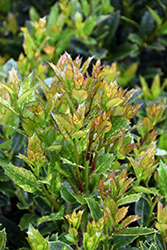Height: 8 feet
Spread: 6 feet
Sunlight:
![]()
![]()
Hardiness Zone: 6
Brand: Garden Debut
Description:
This outstanding holly makes an excellent hedge or screen with its broad, pyramidal habit; lustrous, deep green foliage with a coarse texture; abundant red fruit in winter, when a pollinator is present; a great addition to the landscape
Ornamental Features
Sharum's Shamrock™ Holly is primarily grown for its highly ornamental fruit. It features an abundance of magnificent red berries in late fall. It has attractive dark green evergreen foliage which emerges brick red in spring. The glossy oval leaves are highly ornamental and remain dark green throughout the winter.
Landscape Attributes
Sharum's Shamrock™ Holly is a dense multi-stemmed evergreen shrub with a distinctive and refined pyramidal form. Its relatively coarse texture can be used to stand it apart from other landscape plants with finer foliage.
This is a relatively low maintenance shrub, and is best pruned in late winter once the threat of extreme cold has passed. It is a good choice for attracting birds and bees to your yard. Gardeners should be aware of the following characteristic(s) that may warrant special consideration;
- Spiny
Sharum's Shamrock™ Holly is recommended for the following landscape applications;
- Accent
- Mass Planting
- Hedges/Screening
- Naturalizing And Woodland Gardens
Planting & Growing
Sharum's Shamrock™ Holly will grow to be about 8 feet tall at maturity, with a spread of 6 feet. It has a low canopy with a typical clearance of 1 foot from the ground, and is suitable for planting under power lines. It grows at a medium rate, and under ideal conditions can be expected to live for 50 years or more. This is a female variety of the species which requires a male selection of the same species growing nearby in order to set fruit.
This shrub does best in full sun to partial shade. It does best in average to evenly moist conditions, but will not tolerate standing water. It is very fussy about its soil conditions and must have rich, acidic soils to ensure success, and is subject to chlorosis (yellowing) of the foliage in alkaline soils. It is quite intolerant of urban pollution, therefore inner city or urban streetside plantings are best avoided, and will benefit from being planted in a relatively sheltered location. Consider applying a thick mulch around the root zone in winter to protect it in exposed locations or colder microclimates. This particular variety is an interspecific hybrid.

